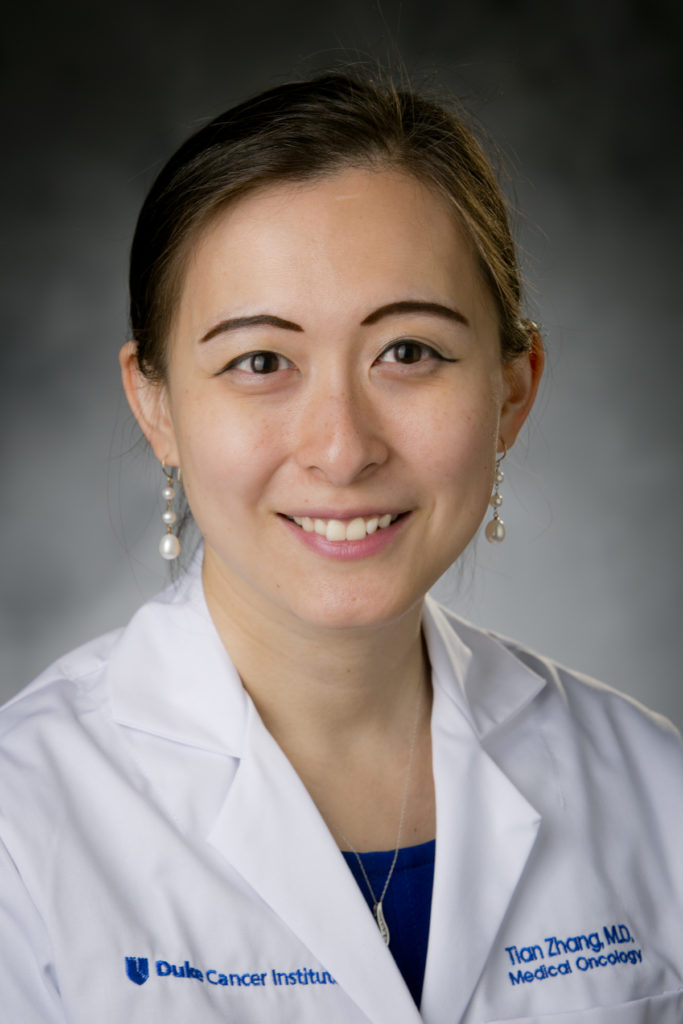
Caregivers are “Difference Makers”
January 15, 2025
This is a guest post by Nicole Scott, whose husband Keith is diagnosed with kidney cancer. Together, they organize “Keith’s…
Read MoreDr. Tian Zhang is a medical oncologist at the Duke Cancer Institute. She received a 2019 Young Investigator Award for research that could help doctors and patients make better decisions when selecting first-line therapies for metastatic clear cell renal cell carcinoma (ccRCC).
Dr. Zhang will analyze how the tumor microenvironment (TME) responds to immunotherapy and investigate a panel of five genes and its association with resistance to ipilimumab/nivolumab combination therapy.
We spoke with Dr. Zhang about her work.
It’s really a discovery of biomarkers… There’s very limited biomarker data – predictive biomarkers – that would drive treatment selection in kidney cancer at this point. We currently have four to five first-line options and it’s really hard to select based on patient characteristics outside the [International Metastatic RCC Database Consortium] criteria. This is one way we’re trying to delve deep into the TME to see which patients might respond better to ipilimumab/nivolumab combination therapy and whether our five gene panel pans out in the ipilimumab/nivolumab treated patients as being predictive for resistance.
If so, some of the applications for this going forward would be if the patient had a very low expression of these genes, potentially they would not be candidates for ipilimumab/nivolumab and potentially we would select them for VEGF therapy or VEGF/immunotherapy combinations. We’re trying to think about a real-world approach where you’re seeing a patient in front of you and thinking about their characteristics at the tumor level – how can we select patients for the treatments they would have the best outcome with?

We think about tumor characteristics driving cancers, but these cancers don’t exist on their own. These cells are surrounded by a stroma and also the immune cells that control significantly tumor development. The microenvironment of a tumor is really rich for discovery in terms of what cells are there, what are the cytokines involved, what genes are being overexpressed… and anything that regulates T-cell activation. Any data to help us understand what the tumor actually looks like is a good way for us to think about how patients might respond to treatment.
One [of my metastatic RCC patients] started on treatment with ipilimumab/nivolumab and… by the time we scanned him in 12 weeks his cancer significantly improved and through a year with immunotherapies he is now in a very, very deep partial response. Another patient I started on ipilimumab/nivolumab who had same spectrum of disease… three months later his disease blew up completely.
I have no way in the clinic to tell whether patients are going to have a beautiful outcome or if they’re going to crash and burn. If I had known my second patient would not respond, no way would I have spent the last three months treating him with this combination when we have perfectly good other options out there. For me it’s about being patient centric. Maybe I’m giving the bad news today to this patient that didn’t respond, but I’m learning in order to drive my understanding of the next patient who presents like this.
Good outcomes unfortunately are not 100 percent. There are always patients who progress and the important thing is we learn from those patients and we understand what the differences are between the patients who progress and the patients who respond. [Patients] are our most valuable resource and they really are helping us understand… what future treatments are going to look like. Being in a clinical trial… [and me] being able to access those tissues and study them further are really important contributions they’re making.
It’s important to me as a clinician investigator to understand more about my patients so that I can change and understand my future patients. I really appreciate the… different advocacy groups and the [Department of Defense Kidney Cancer Research Program] that are really supportive of early career investigators. The more we understand and investigate these kidney cancers and tumors and the biology behind them, the more we’ll be able to inform on future clinical trials that will change standard of care.